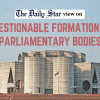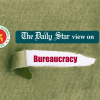Relaxing service rules will only exacerbate corruption

In another questionable move with the potential to exacerbate corruption, the government seems set to allow public servants to engage in stock market trading, reversing a decades-old prohibition. According to a report, the law ministry has positively vetted an amendment to the Government Servants (Conduct) Rules, 1979 forwarded by the public administration ministry. If or once it is approved, employees will be able to legally buy or sell primary shares and bonds of registered companies. This is one of the several changes being billed as necessary for a "modern and time-befitting" code of conduct. But given past experiences, we must say this is the wrong way to go about it as allowing officials to trade stocks may open a Pandora's box of unethical practices.
We don't need to go that far back in time to understand why. Matiur Rahman, a top NBR official now under investigation for corruption, allegedly made a fortune through stock market investments, using insider information, both of which are illegal. He is not alone in such pursuits. Many government employees, despite current prohibitions, are believed to be engaged in stock trading. Many have already demonstrated their willingness to exploit their power and privileged access for personal gain. Against this backdrop, legalising stock trading could widen the scope for corruption. The speculative nature of stock markets means that losses are inevitable, and when faced with losses, employees might be tempted to recoup them through illegal means.
The proposed amendment, therefore, will further weaken, rather than fortify, the ethical framework governing public officials. Unfortunately, the public administration ministry seems to be blind to such concerns. In another editorial not long ago, we commented on its proposal to relax another provision in the Government Servants (Conduct) Rules requiring officials to submit wealth statements every five years, and how the removal of such an important layer of scrutiny could encourage dishonest officials to commit crimes with little fear of detection. Over the years, we have seen how such anti-graft rules and regulations have been relaxed, sometimes even lightening penalties for proven corruption.
As we write this, news has emerged of another top official, a former additional IGP, and his wife who illegally amassed wealth worth Tk 30.35 crore while concealing information of wealth worth Tk 36.91 crore—adding to the recent disclosures of scandals involving former and current security and revenue officials. The list will only grow, whether it comes to light or not, unless we toughen up relevant rules, enhance existing oversight mechanisms, and enforce stricter penalties for violations. Government employees, because of the power they exercise, must be held to the highest standards of conduct. We, therefore, urge the public administration ministry and other authorities to refrain from further relaxing service rules.


 For all latest news, follow The Daily Star's Google News channel.
For all latest news, follow The Daily Star's Google News channel. 









Comments